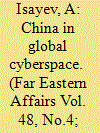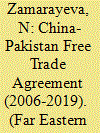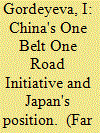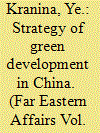|
|
|
Sort Order |
|
|
|
Items / Page
|
|
|
|
|
|
|
| Srl | Item |
| 1 |
ID:
179228


|
|
|
|
|
| Summary/Abstract |
The situation in cyberspace is now taking a very tense turn, due to the rivalry between the world largest economies for leadership in the digital environment. This paper analyzes the role and importance of China's strategy in the information environment and demonstrates the growing impact China has on the decision-making process in the digital environment in the international arena with regard to different technical issues and managing principles. We examine China's defense policy in this area, as well as the country's gradual transformation into one of the world's cyber superpowers capable of challenging American dominance on the Internet, which has already led to sharp confrontation and rivalry between China and the United States in today's information environment; to technological wars; to the development of arsenals of military viruses on both sides; and to the development of information war strategies and tactics.
|
|
|
|
|
|
|
|
|
|
|
|
|
|
|
|
| 2 |
ID:
179230


|
|
|
|
|
| Summary/Abstract |
This article deals with the current regional, bilateral and domestic challenges in preparation for and implementation of basic stages of the China-Pakistan Free Trade Agreement (FTA) which has been an integral part of the Chinese One Belt, One Road global project (OBOR), or the Belt and Road Initiative (BRI).
|
|
|
|
|
|
|
|
|
|
|
|
|
|
|
|
| 3 |
ID:
179233


|
|
|
|
|
| Summary/Abstract |
This article deals with Japan's reaction to the One Belt One Road initiative put forward by China and formation of Japanese strategy toward the PRC under new conditions. We analyze Indo-Pacific region conception developed by Japan and the United States. There are attempts to involve India in the creation of an anti-Chinese "Quartet" of states that includes the United States, Japan and Australia. Alternative economic programs of Japan, its struggle with China for influence in Southeast Asia, and Tokyo's attempts to prevent "Chinese expansion" in the South China Sea are discussed. Attention is drawn to the fact that Japanese society is increasingly in favor of establishing economic cooperation with Beijing in the countries of the region.
|
|
|
|
|
|
|
|
|
|
|
|
|
|
|
|
| 4 |
ID:
179236


|
|
|
|
|
| Summary/Abstract |
This article calculates and analyzes the integral demographic security index of Russia and China for the period 2001-2018. The following indicators were used to calculate the integral demographic security index: fertility rate; mortality rate; infant mortality rate; total fertility rate; natural increase rate; share of the population under 15 years old; share of the population over 65 years old; life expectancy; migration growth rate. The integral demographic security index was calculated from the average sum of individual indicators. It is shown that both countries are currently located in a zone of social tension. Russia's security indicators are lower than China's, suggesting that there are more factors that worsen Russia's security indicator performance.
The factors that have the greatest impact on the decline of the demographic security indicators are low fertility and increase in the share of the population over 65 years old. It is shown that one of the factors of low fertility is the reduction in the number of women of fertile age. The increase in life expectancy contributes to the rapid growth of the share of the older age population, it is growing particularly fast in China. Unfavorable demographic trends can further lead to a slowdown in economic growth and generally affect the geopolitical situation.
|
|
|
|
|
|
|
|
|
|
|
|
|
|
|
|
| 5 |
ID:
179231


|
|
|
|
|
| Summary/Abstract |
The Fourth National Economic Census conducted in China in 2019 played an important role in identifying the economic potential, problems, and development prospects of the national economy in the final stage of the 13th Five-Year Plan (2016-2020).
The base time of the census was December 31, 2018. The census covered 31 regions of the country: all legal entities operating in China, without exception (in the secondary and tertiary sectors of the economy - industry, construction, and numerous service industries), as well as their subordinate production and economic structures and organizations, and individual households registered as physical entities.
One of the main places in the census is devoted to the state of private and individual enterprises, which constitute the overwhelming majority in the secondary and tertiary sectors of the economy. Medium-sized, small, and microenterprises with the status of a legal entity, as well as individual farms, are singled out as a separate subject of research. This shows their priority importance in ensuring high-quality and sustainable development of the country, expanding employment channels, and increasing the material wellbeing of citizens.
|
|
|
|
|
|
|
|
|
|
|
|
|
|
|
|
| 6 |
ID:
179232


|
|
|
|
|
| Summary/Abstract |
This article analyses major directions of Japan's economic cooperation with Central Asia countries. It is focused on cooperation in the mining industry and aid in building energy infrastructure in the region. Japan's presence is also visible in other industrial sectors and agriculture. Japan's projects in Central Asia deal primarily with advanced technologies, high-quality infrastructure, and training of human resources. As countries of the region declare their intention to reduce their dependence on exports of mineral resources and to follow the path of modernization, these are the prospects of their cooperation with Japan. Presence of other Asian countries in the region for Japan is both creating challenges and offering new opportunities for cooperation.
|
|
|
|
|
|
|
|
|
|
|
|
|
|
|
|
| 7 |
ID:
179227


|
|
|
|
|
| Summary/Abstract |
This article examines the role of Mongolia as a mediator and peacemaker in the settlement of the conflict on the Korean Peninsula in line with its "third neighbor" foreign policy concept. The author shows why Mongolia enjoys the confidence of the parties involved in the conflict and is perceived by them as a most suitable mediator. He proceeds to analyze the actual mediation activities of the Mongolian leadership concerning Korea, including confidence-building measures with both states of the Korean Peninsula, organization of bilateral and multilateral meetings and negotiations on Mongolian soil, and the establishment of an international dialog platform in the form of the international conference known as the Ulaanbaatar Dialog on Northeast Asia Security. In conclusion the author points out that friendly relations of Mongolia with the Democratic People's Republic of Korea (DPRK) and the Republic of Korea gain special significance in the context of current deterioration of relations between North and South Koreas, since it is the Mongolian side that will be able to give support to the parties in conflict and their allies in resolving acute issues during the current crisis.
|
|
|
|
|
|
|
|
|
|
|
|
|
|
|
|
| 8 |
ID:
179237


|
|
|
|
|
| Summary/Abstract |
Since the disintegration of the bipolar world, China's role in global and regional affairs has increased dramatically, prompting Chinese expert circles to undertake theoretical studies on important issues such as state economic interests, national security, and geostrategy for global and regional trade. Beijing has developed a long-term foreign policy, the essence of which is the following formula: "Appease the West, lean on the North, fight for the East and the South." It is believed that China as a state in the eastern part of Eurasia simply must develop strategic partnerships with the leading powers of the Eurasian continent, such as Germany, Russia, and India, because only through the process of "independent" and "joint" transformation with them can China finally become the main driving force of the changing world system. Its powerful economic potential allows Beijing to have a noticeable impact on the geopolitical situation in Eurasia and pursue an independent foreign economic policy.
|
|
|
|
|
|
|
|
|
|
|
|
|
|
|
|
| 9 |
ID:
179229


|
|
|
|
|
| Summary/Abstract |
Public diplomacy promotion programs have become the key tool used by the United States to provide international support for US foreign policy toward North Korea, as well as to put information pressure on the North Korean regime and attempt to influence the North Korean audience. Despite the fact that the key goal of American foreign policy and public diplomacy with regard to the DPRK is denuclearization of North Korea, the transformation of the North Korean regime is put forward as a condition for its conventionalization. The author concludes that the United States will continue its aggressive informational public diplomacy toward North Korea, due to growing competition with China and Washington's unwillingness to incorporate North Korea in the international community without transforming its political system.
|
|
|
|
|
|
|
|
|
|
|
|
|
|
|
|
| 10 |
ID:
179235


|
|
|
|
|
| Summary/Abstract |
This article deals with the current problems of spatial development in Primorye Territory and the Sakhalin Region. We present the results of sociological research conducted by the authors in these regions in September 2019. The sample was assembled from a model using the key characteristics of the general population, based on the principles of quota-proportional and territorial methods. The total excerpt size is 468 respondents. The empirical object of the study is the adult population of the regions.
|
|
|
|
|
|
|
|
|
|
|
|
|
|
|
|
| 11 |
ID:
179234


|
|
|
|
|
| Summary/Abstract |
The 13th Five-Year Plan (2016-2020) reflects Beijing's comprehensive approach to improving the environmental situation in China. It includes mechanisms for stimulating "green" and low-carbon manufacturing, and measures for improving air, water, and soil quality. Standards for the emission of pollutants are being tightened to protect the environment, and a diversified mechanism of compensating for ecological damage is being created on the basis of market principles. China has had definite successes in controlling environmental pollution, raising the coefficient of water, air, and solid waste purification. Municipal water supplies and sanitation have been improved, and gas and central heating are being introduced on a broader scale. Efforts to conserve energy have yielded positive results. The task is now to overcome the rise in environmental devastation, improve the situation in major rivers and lakes, and reduce the levels of acid rain and discharges of carbon dioxide into the atmosphere. In the area of international cooperation, China is adhering to a course of energy conservation and working actively with other countries in the field of ecology under conditions of mutual benefit.
|
|
|
|
|
|
|
|
|
|
|
|
|
|
|
|
|
|
|
|
|